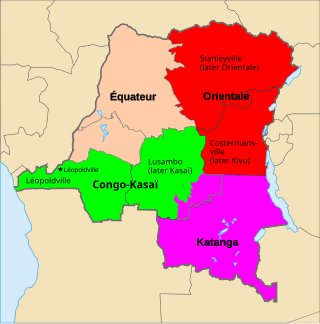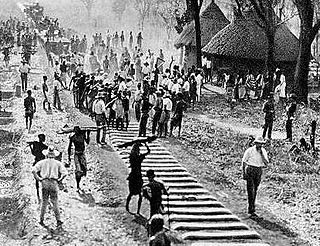| |||||
| Decades: | |||||
|---|---|---|---|---|---|
The following lists events that happened during 1907 in the Congo Free State .
| |||||
| Decades: | |||||
|---|---|---|---|---|---|
The following lists events that happened during 1907 in the Congo Free State .
| Date | Event |
|---|---|
| Félix Fuchs is appointed vice governor-general | |
| Tanganyika Concessions digs the first pits and trenches in the Etoile Mine area. [1] | |
| Alexis Bertrand becomes commissioner of the District of Équateur. [2] |

Katanga was one of the four large provinces created in the Belgian Congo in 1914. It was one of the eleven provinces of the Democratic Republic of the Congo between 1966 and 2015, when it was split into the Tanganyika, Haut-Lomami, Lualaba, and Haut-Katanga provinces. Between 1971 and 1997, its official name was Shaba Province.

The Democratic Republic of the Congo (DRC), also known as Congo-Kinshasa, is a country in Central Africa. By land area, the DRC is the second-largest country in Africa and the 11th-largest in the world. With a population of around 112 million, the Democratic Republic of the Congo is the most populous officially Francophone country in the world. The national capital and largest city is Kinshasa, which is also the economic center. The country is bordered by the Republic of the Congo, Central African Republic, South Sudan, Uganda, Rwanda, Burundi, Tanzania, Zambia, Angola, the Cabinda exclave of Angola and the South Atlantic Ocean.

Équateur was a province in the northwest of the Belgian Congo and the successor Republic of the Congo, now known as Democratic Republic of the Congo. It had its origins in the Équateur District of the Congo Free State, the private property of King Leopold II of Belgium. It was upgraded to the status of a province in 1917. Between 1933 and 1947 it was named Coquilhatville. In 1962 it was divided into three smaller provinces, but there were recombined in 1966. Équateur was one of the eleven provinces of the Democratic Republic of the Congo until 2015, when it was split into the new, smaller Équateur province, as well as the Tshuapa, Mongala, Nord-Ubangi and Sud-Ubangi provinces.

The Government of the Democratic Republic of the Congo is the second institution in the central executive branch of the Democratic Republic of the Congo, the first institution being the President, who has the title of head of state.

Its location in the center of Africa has made the Democratic Republic of the Congo a key player in the region since independence. Because of its size, mineral wealth, and strategic location, Zaire was able to capitalize on Cold War tensions to garner support from the West. In the early 1990s, however, with the end of the Cold War and in the face of growing evidence of human rights abuses, Western support waned as pressure for internal reform increased.
This is a survey of the postage stamps and postal history of the Democratic Republic of the Congo, formerly Zaire and the Belgian Congo.

Metorex is a mining company based in Johannesburg, South Africa. It has assets in the Democratic Republic of the Congo (DRC), Zambia and elsewhere. A takeover bid by the Jinchuan Group of China valued the company at US$1.1 billion. Since January 2012, the company is a wholly owned subsidiary of Jinchuan Group.
The Ruashi Mine is an open-pit copper and cobalt mine operated by Metorex that is located about 10 kilometres (6.2 mi) from Lubumbashi in Katanga Province, Democratic Republic of the Congo. The project includes a plant to concentrate the ore from the Ruashi and Etoile mines, and a modern solvent extraction electrowinning (SX-EW) processing plant. As of 2008, annual capacity was estimated to be 10,000 tonnes of copper and 1,000 tonnes of Cobalt.
The Etoile Mine is an open-pit copper mine on the outskirts of Lubumbashi in Katanga Province of the Democratic Republic of the Congo (DRC). Chemaf owns the license. Chemaf is 95% owned by Shalina Resources and 5% by the DRC government.
The Musoshi Mine is an underground copper mine in the Katanga Province of the Democratic Republic of the Congo. The mineral rights are owned by the South African miner Metorex.
Ruashi or Rwashi is a commune of the city of Lubumbashi in the Democratic Republic of the Congo.
The following lists events that happened during 2012 in the Democratic Republic of the Congo.
Bolomba Territory is an administrative area in Équateur Province in the Democratic Republic of the Congo. The headquarters is the town of Bolomba. It is located northeast of the provincial capital of Mbandaka. Its main waterway is the Ikelemba River which is navigable down to the Congo River.
Laurent-Gabriel Eketebi, later Eketebi Moyidiba Mondjolomba, was a Congolese politician who served as President of Équateur Province from June 1960 until September 1962 and as President of Moyen-Congo Province from then until June 1964. He later served as State Commissioner of Transport and Communications from July 1972 until January 1975, when he was dismissed and charged with various financial crimes. Eketebi was convicted, but received a pardon in 1994. He died in 2006.

The Compagnie de Chemin de fer du Katanga (CFK) was a railway company in the Congo Free State and Belgian Congo between 1902 and 1952. It held the railway concession that linked the port of Bukama on the navigable section of the Lualaba River through the mining region and the town of Elisabethville (Lubumbashi) to Sakania, where it connected with the Rhodesian railway network. Operations were subcontracted to the Compagnie du chemin de fer du bas-Congo au Katanga (BCK).
The following lists events that happened during 1893 in the Congo Free State.
The following lists events that happened during 1889 in the Congo Free State.
The following lists events that happened during 1933 in the Belgian Congo.
The following lists events that happened during 1917 in the Belgian Congo.